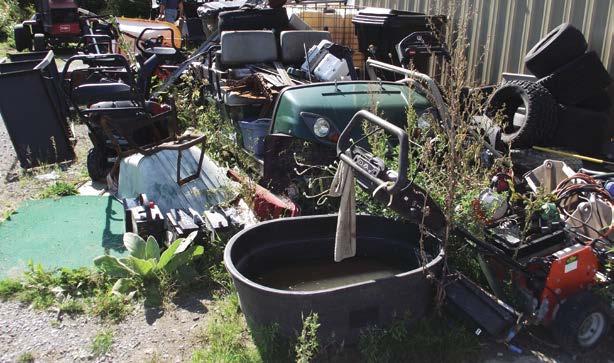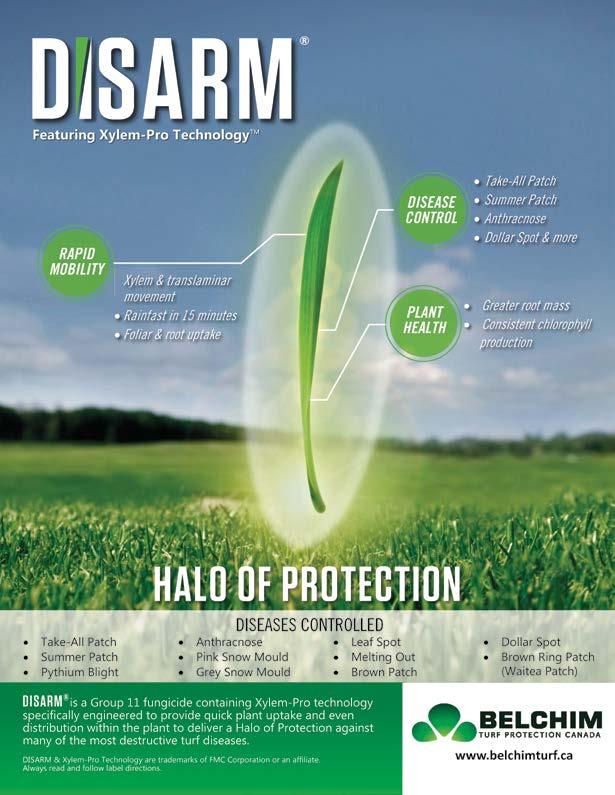
4 minute read
Get Ready for Spring and a Safe Golf Season!
by Blenheim
Written by and photos provided by Bill Godkin, CEsafety. Since 2006, CEsafety has been working with golf courses across Ontario, Alberta, and beyond to identify and eliminate safety hazards that may otherwise result in a serious injury to a worker or a customer. There are many types of safety precautions a superintendent should take before opening each spring and safety checks should happen frequently throughout the year. This monthly safety check list will give you a good place to start!
Monthly Safety Checklist
Advertisement
o Inspect all fire protection equipment, extinguishers, exits, hoses and alarm systems, detectors and other emergency equipment.
Make sure that all are in good working condition and that none are blocked. o Are oily rags present and in the proper container? o Have all flammable materials been properly stored in the flammable storage cabinet? o Has this cabinet been inspected recently to ensure that materials are not in there that could cause combustion? I.E. Batteries, acids o Are there any secondary chemical containers that require a WHMIS label or the label is missing information? o Are all of the safety data sheets available and do they meet current standards? o Have all chemicals been stored in their designated areas as per the chemical hazard training program? o Are all breaker panels free of obstructions and nothing stored in front of or under them for a distance of one meter? Are the doors on the breaker panels closed and in good condition? o Are all electrical cords, airlines and hydraulic hoses in good working order? Have inspection stickers been placed on them? o Are there GFCI’s in place and being used? o Is housekeeping up to an acceptable standard? o Are items stored so that they are not blocking pedestrian walkways? o Are there any tripping hazards? o Have all permanent aisles, passageways and storage areas been clearly marked? o Are there any items stored higher than ground level that pose a potential danger to anyone if they fell? o Have all brooms, mops and other items been properly secured so that they will not tip over and become a tripping hazard? o Inspect the lock out board to make sure that all items are there. o Look in the Personal Protective Equipment cabinet or storage area to see if it has all necessary PPE. o Examine the first aid kit(s) to ensure all of the contents are there and that the logbook is up to date. o Has WHMIS 2015 training been done for all employees? o Inspect the eyewash stations and safety showers. Clean any chemicals, dirt or debris off of all areas of the eyewash stations and safety showers. Flush the lines to the eyewash stations and safety showers until the water is clear. (This must be done every week and recorded on a checklist.) Ensure that the eyewash bottles have been filled with liquid. Ensure that the eyewash stations are not blocked. o Is the lift truck/powered equipment inspection sheet up to date? o Have the training records of all employees, current and new, been updated? o Have safety-training sessions for employees been scheduled? o Has the safety committee had their required meeting and performed their inspection? o Have the operating procedures of any task changed significant enough to require an updated job safety hazard analysis review? o Is the Health and Safety policy due for review? o Has a prestart up safety review been performed on any new equipment or buildings? o Inspect all ladders to ensure that they are safe to use. Remove any ladders with cracks, signs of damage or if they are missing any nonslip grips on their feet. Secure all ladders when not in use. o Has there been a safety mini-meeting this month? o Have all of the employees’ boards been updated? o Has a meeting been held in the calendar year for all employees on workplace violence and harassment in the workplace? o Have any new employees been trained in our policies on workplace violence, harassment and sexual harassment in the workplace? o Have all workers signed their employee’s agreement and the right to refuse to perform unsafe work document? o Are all Supervisors aware of their responsibilities as a Supervisor, have they been trained to be a Supervisor and has this training been documented? o Are there sufficient quantities of hand sanitizers, gloves, masks and training done to deal with COVID-19 protocols? Has this been documented? Are signs, plexiglass barriers, arrows on the floor to direct foot traffic in place?
DISCLAIMER
This information has been compiled from a variety of sources believed to be reliable and to represent the best current opinion on the subject. How¬ever, neither CEsafety nor its authors guarantee accuracy or completeness of any information contained in this publication, and neither CEsafety nor its authors shall be responsible for any errors, omissions, or damages arising out of the use of this information. Additional safety measures may be required under particular circumstances. We strive to make our product as complete as possible. However, due to its "generic nature", CEsafety assumes no liability for any industry specific information which may or may not be covered. All final, legal, and financial responsibility is assumed by the individual or organization which purchases this product. Other training may be required for certification (in certain fields) and in all cases "hands-on" job training is required. The information contained within this (these) document(s) are solely advisory, and should not be substituted for legal, financial or other professional advice. CEsafety cannot be held responsible for actions taken without proper advice.











